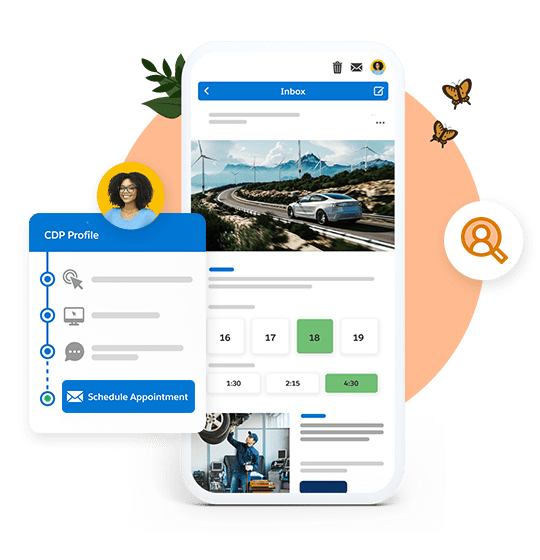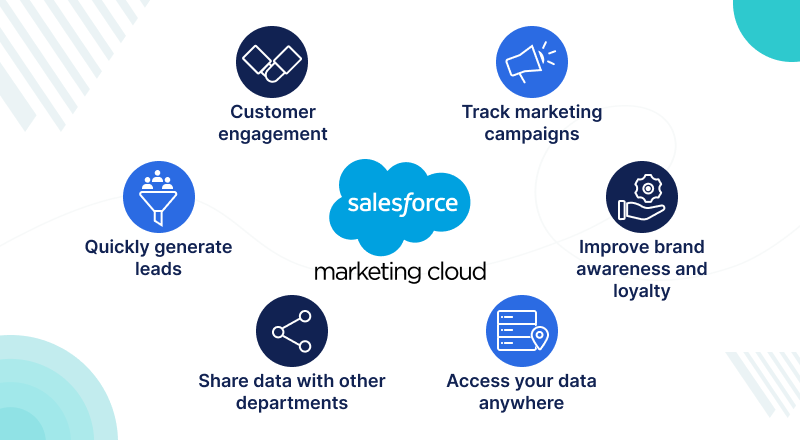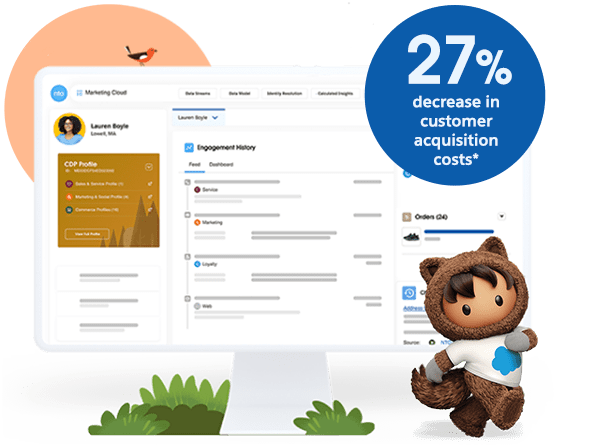Blogs

Things you need to know about Salesforce Marketing cloud
ExactTarget was a marketing automation company that was acquired by Salesforce in 2013. It provided a range of marketing tools, including email marketing, social media marketing, and lead generation. After the acquisition, ExactTarget’s marketing platform was integrated into Salesforce and became known as the Salesforce Marketing Cloud. It offers a wide range of tools and features to help companies reach, engage, and retain their customers through various channels. As soon as you start using SFMC, you’ll realize that this feature-rich product can be a very powerful tool for your business.
Advantages of using Salesforce Marketing Cloud
Salesforce offers a range of marketing tools and features: Salesforce Marketing Cloud provides a range of tools and features to help businesses reach, engage, and retain their customers through various channels. These include
Email Marketing: This feature allows businesses to create, send, and track email campaigns to targeted audiences.
Social Media Marketing: The social media marketing feature allows you to manage and optimize your social media marketing efforts across various platforms, such as Facebook, Twitter, and LinkedIn.


Mobile Marketing: This feature enables you to create and deliver personalized mobile marketing campaigns to your customers.
Web Personalization: You can deliver personalized content and experiences to your website visitors based on their behavior and preferences.
Marketing automation: You can use Salesforce to create and manage marketing campaigns, including email marketing, lead generation, and social media marketing.
Contact and lead management: With Salesforce, you can store and maintain your customer contact information, as well as the track leads through the sales process.
Improved customer relationships: Salesforce provides a holistic view of customer interactions. It allows businesses to get a complete view of customer interactions and behavior across different touchpoints. This enables businesses to personalize their marketing campaigns and deliver a seamless customer experience.
Increased sales: Salesforce provides tools to help businesses track and manage sales activities, including lead tracking and forecasting, which can help increase sales.
Decrease in customer acquisition costs
Facilitates collaboration & team management: Salesforce’s platform allows your team to share information and collaborate in real-time, improving communication, project tracking, and increasing efficiency.
Improved data analysis: Salesforce provides a range of tools to help you analyze customer data, including reports and dashboards, allowing you to make data-driven decisions.
Customization & Scalability: As a cloud-based platform, Salesforce can be easily scaled up or down to meet the needs of your business as it grows. It is highly customizable and can be tailored to fit the specific needs of each business. This enables businesses to create marketing campaigns and initiatives that are perfectly suited to their target audience and goals.
Enables easy data integration: Salesforce Marketing Cloud allows businesses to easily integrate their data from different sources, such as their CRM, website, and social media, to get a more complete picture of their customers and their interactions with the business.

*27% decrease in customer acquisition costs. Source: 2022 Salesforce Success Metrics Global Highlights. A 2022 study based on 3,706 customer interviews in the US, Canada, UK, Germany, France, Australia, India, Singapore, Japan, and Brazil.
To get the most out of Salesforce Marketing Cloud, it’s important to follow some best practices during the implementation process. Here are a few tips to keep in mind:

Define your marketing goals and objectives: Clearly defining your marketing goals and objectives will help you determine which features and tools are most important to your business.
Segment your audience: Segmenting your audience into smaller groups based on common characteristics, such as location, demographics, or behavior, will allow you to deliver more targeted and personalized marketing messages.
Integrate your data: Integrating your data from different sources, such as your CRM, website, and social media, will help you get a more complete picture of your customers and their interactions with your business.
Test and optimize: Testing and optimizing your marketing campaigns and initiatives will help you fine-tune your marketing strategy and improve results over time.
By following these best practices, you can ensure that your Salesforce Marketing Cloud implementation is a success and helps drive your business forward.
What are the values of Salesforce?

Trust: The value of trust is essential to the way Salesforce does business. By being open, transparent, and honest, the company can build strong relationships with its customers and stakeholders.
Customer Success: Customer success is also a top priority for Salesforce. The company aims to help its customers achieve their goals and grow their businesses through the use of its platform and tools.
Innovation: Innovation is a key value for Salesforce, as the company is always looking for new and better ways to improve its products and services.
Equity: Salesforce promotes diversity, equity, and inclusion to unlock the potential of every team member.
Sustainability: Salesforce’s vision is to reduce carbon emissions by 200 gigatons by conserving, restoring, and growing 1 trillion trees, and to energize the ecopreneur revolution.
Giving back: It is important to Salesforce, and the company is committed to making a positive impact in the communities where it operates. This includes charitable efforts and sustainability initiatives.
Growth: Growth is also important to Salesforce, both in terms of personal and professional development for its employees and in helping its customers grow their businesses.